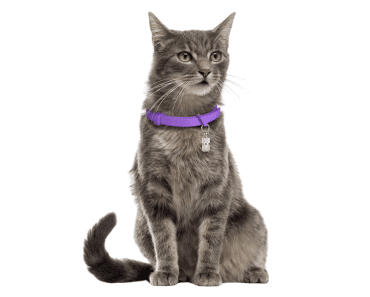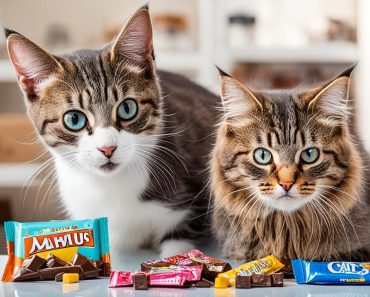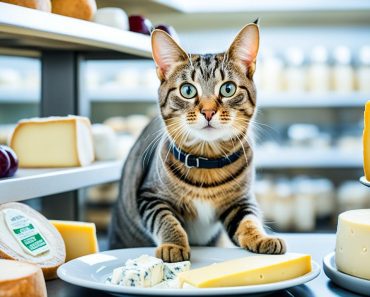As a cat owner, I understand the importance of providing a balanced and nutritious diet for our feline friends. However, when it comes to certain foods, such as chicken bones, it’s essential to know what is safe and what can potentially harm our beloved pets. In this article, I will explore the topic of whether cats can eat chicken bones, highlighting the risks involved and offering valuable safety tips and advice.
Can Cats Eat Chicken Bones? Yes, they can. But it can be dangerous.
- While cats are obligate carnivores, meaning their diet should primarily consist of meat, chicken bones are not a safe choice.
- Chicken bones, whether cooked or raw, can pose several dangers to a cat’s health, including damage to the digestive system, the risk of infection, and the possibility of choking.
- If you suspect your cat has ingested chicken bones, it is essential to monitor their behavior closely and seek veterinary advice if any signs of distress arise.
- Preventing cat access to chicken bones and ensuring a balanced feline diet are crucial steps in keeping our furry friends healthy and happy.
- Consult with a veterinarian to determine the best nutrition plan for your cat and explore safe alternatives, like bone broth, to provide necessary nutrients.
Why Shouldn’t Cats Eat Chicken Bones?
Cats are obligate carnivores, which means their diet should primarily consist of meat. While wild cats may consume bones as part of their natural diet, the bones of small prey are less likely to cause harm. However, chicken bones, especially when cooked, can be hazardous for cats.
Cooked chicken bones are more likely to splinter and can cause damage to a cat’s digestive system if ingested. The sharp edges of splintered bones can tear and irritate the delicate tissues of the gastrointestinal tract. This can lead to serious internal injuries and require immediate veterinary attention.
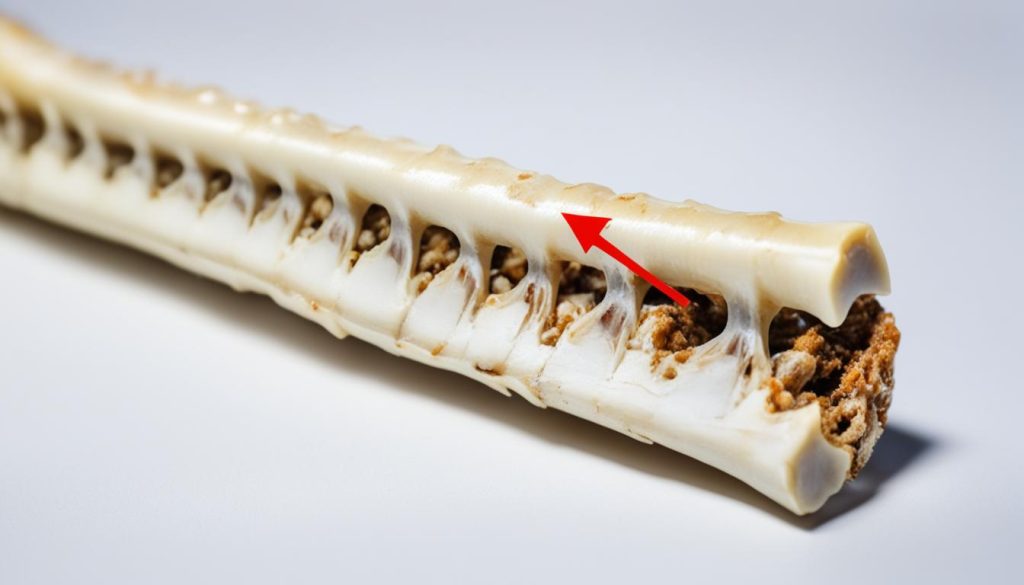
In addition to the risks associated with cooked chicken bones, even raw chicken bones can pose a threat to a cat’s health. Raw bones can potentially cause blockages in the digestive tract, leading to discomfort, pain, and even surgery in severe cases. Cats have a retractable claw mechanism, which allows them to tear and chew their food properly. However, chicken bones can be too hard and brittle for a cat’s teeth and jaw strength, making them difficult to chew and digest.
In order to ensure a cat’s safety and wellbeing, it is best to avoid feeding them chicken bones altogether. There are plenty of other safe and nutritious options available for cats, such as commercially prepared cat food that provides all the essential nutrients they need. A balanced feline diet will help maintain their optimal health without the potential risks that come with feeding them chicken bones.
The Dangers of Cats Eating Chicken Bones
When it comes to cat health and proper nutrition, it is crucial to be aware of the potential dangers associated with cats consuming chicken bones. The hard and brittle nature of chicken bones can pose serious risks to a cat’s well-being.
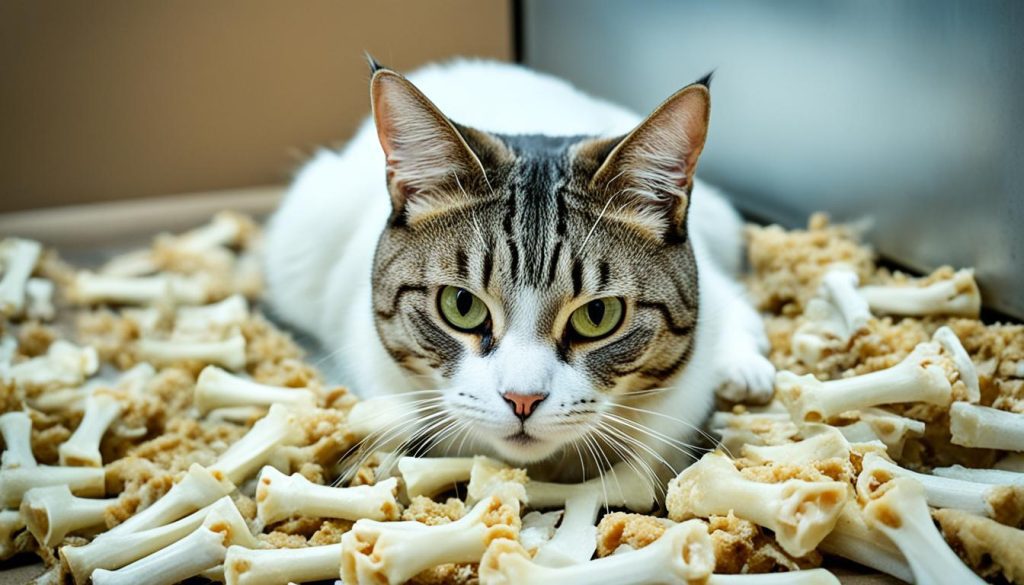
One of the main dangers is the damage they can cause to a cat’s gastrointestinal tract. The sharp edges of chicken bones can easily puncture the stomach, esophagus, and intestines, leading to severe complications. In some cases, surgery may be necessary to address the blockage and repair any internal injuries.
Infections are another concern when cats eat chicken bones. Raw chicken bones can carry harmful bacteria that can be transmitted to both cats and humans, potentially leading to illness and further complications.
Choking is also a significant risk for cats who consume chicken bones. These bones can become lodged in a cat’s throat or airway, obstructing their breathing. This can be a life-threatening situation that requires immediate veterinary attention.
Given these dangers, it is essential for cat owners to take proactive measures to prevent their cats from ingesting chicken bones. Avoid leaving chicken bones within reach of your cat, and ensure proper disposal of any bones to prevent accidental ingestion.
Providing a balanced feline diet that meets all of your cat’s nutritional needs is crucial for their overall health and well-being. High-quality cat food formulated specifically for feline nutrition is the best way to ensure your cat is receiving the necessary nutrients without the risks associated with bone consumption.
When to Worry and What to Do
If you suspect that your cat has ingested a chicken bone, it is crucial to closely monitor your pet for any signs of distress. Pay attention to symptoms such as vomiting, diarrhea, lethargy, loss of appetite, and fever. If you notice any of these symptoms, it is essential to seek veterinary advice as soon as possible. Remember, early intervention can make a significant difference in your cat’s health and well-being.
To ensure your cat’s safety, it is important to prevent further consumption of bones. Keep a close eye on your cat and remove any accessible chicken bones from their environment. In addition, seeking prompt medical attention is crucial in cases of potential danger. A professional veterinarian will be able to assess your cat’s condition and provide appropriate guidance and treatment.
In some instances, your veterinarian may recommend a soft, bland diet to help cushion any bone fragments and aid in digestion. This can help alleviate potential discomfort and reduce the risk of complications. Following their advice and closely monitoring your cat’s well-being are critical steps in ensuring a safe recovery.
Remember, complications from chicken bone ingestion can sometimes require surgical intervention. Ongoing monitoring of your cat’s health is vital, even after immediate symptoms subside. If you notice any unexpected changes in behavior or if you have concerns, do not hesitate to consult with your veterinarian.
Being vigilant and taking appropriate action can greatly contribute to your cat’s health and safety. Remember, it’s our responsibility as pet owners to provide the care and attention our furry friends need. By understanding the potential dangers of chicken bone ingestion and knowing when to seek help, you can protect your cat from unnecessary risks and ensure their well-being.
Cats and Chicken Bones: A Final Thought
Feeding your cat chicken bones may seem like a natural and nutrient-rich choice, but it’s important to consider the potential risks to your cat’s health. While chicken bones do contain calcium and other nutrients, there are safer ways to provide these essential elements in your cat’s diet.
Instead of feeding your cat chicken bones, opt for high-quality, balanced cat food that is specifically formulated to meet their nutritional needs. These cat foods are designed to provide all the necessary nutrients without the risks associated with bone consumption. They are carefully curated to support feline health and well-being. Consulting with a veterinarian can provide you with useful guidance on proper nutrition for your cat.
If you still want to incorporate bone-related nutrients into your cat’s diet, a safer alternative to actual bones is bone broth. Bone broth is made by simmering bones in water for an extended period, resulting in a nutritious liquid that can be added to your cat’s food. Bone broth retains many of the beneficial nutrients found in bones, without the risk of splintering or causing damage to your cat’s digestive system.
Ultimately, the key to maintaining your cat’s health and well-being lies in providing a balanced and complete feline diet. By choosing high-quality cat food and seeking advice from professionals, you can give your cat the nutrients they need without compromising their health.
Conclusion
It is crucial to prioritize the health and well-being of our beloved feline companions by avoiding the feeding of chicken bones. The potential risks associated with chicken bone consumption can have detrimental effects on a cat’s health. Cooked chicken bones are prone to splintering, posing a serious danger to a cat’s delicate digestive system. On the other hand, raw chicken bones can result in blockages and tears within the gastrointestinal tract, leading to severe complications.
Additionally, infections and choking are further potential hazards that can arise from cats consuming chicken bones. To ensure optimal cat health, it is best to focus on providing a balanced and nutritionally complete diet. High-quality cat food, specifically designed to meet a cat’s nutritional requirements, should be the mainstay of their diet.
If, by chance, a cat ingests chicken bones, immediate veterinary advice should be sought. Close monitoring of the cat for any signs of distress is essential. Remember, our vigilant care and proactive approach to pet care play crucial roles in safeguarding our feline friends from unnecessary harm.

